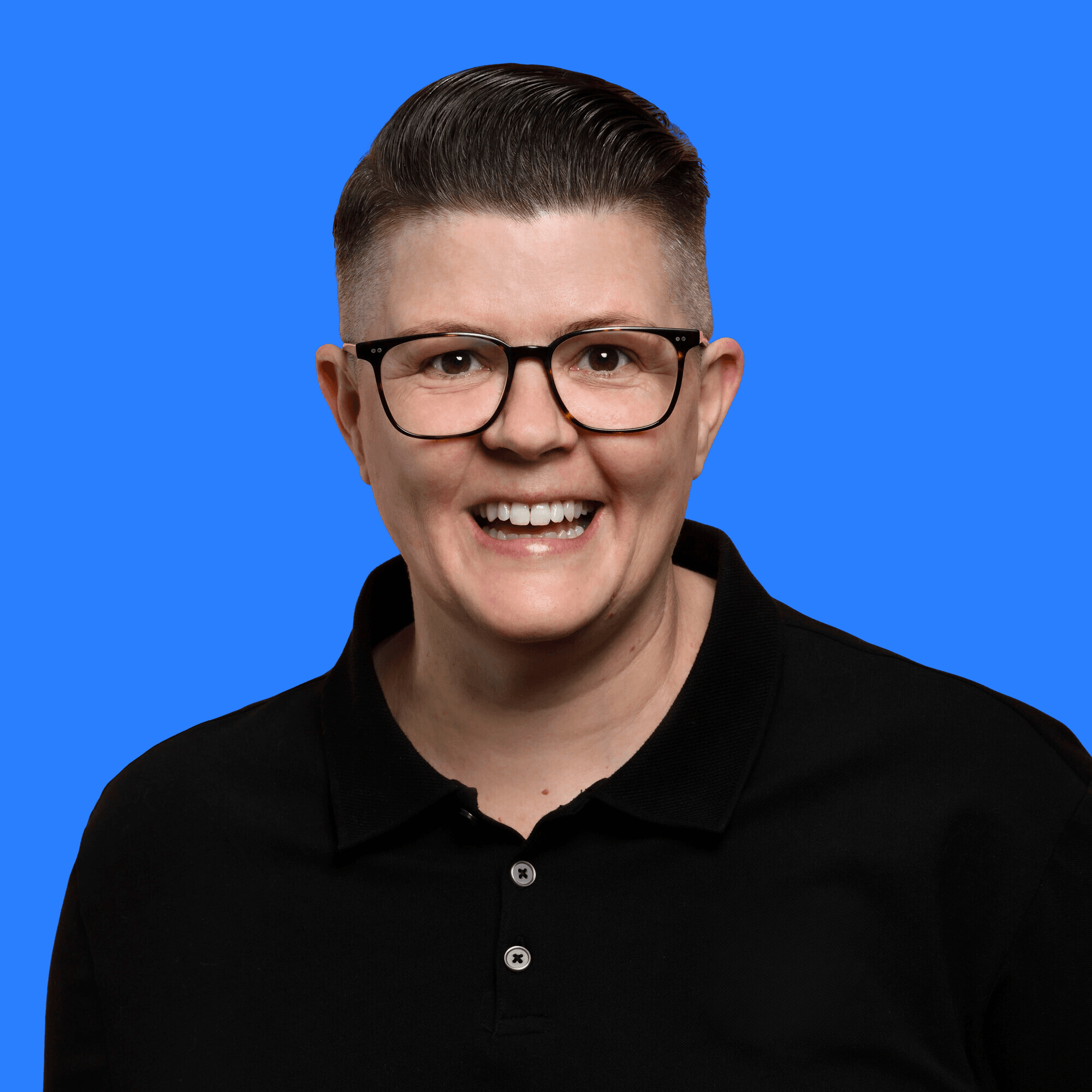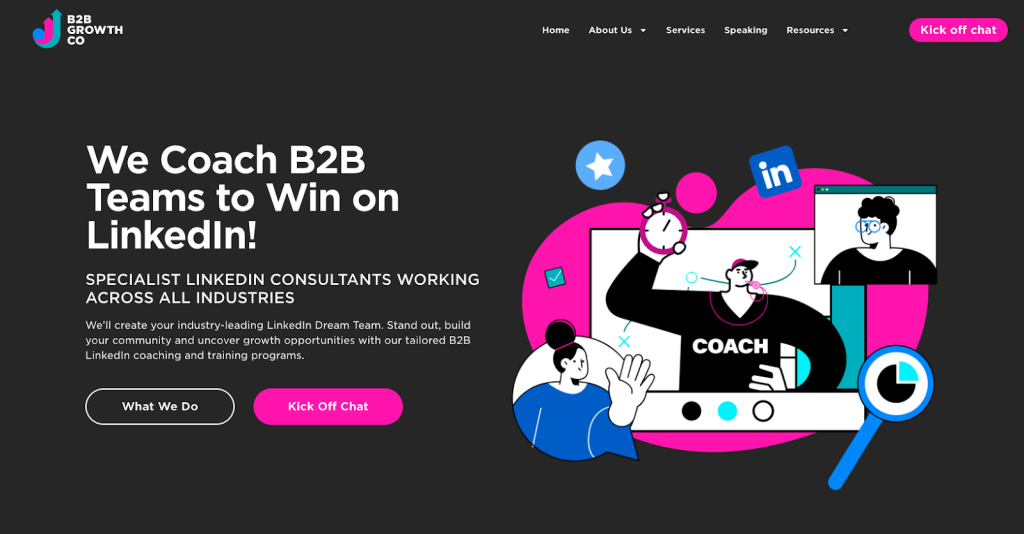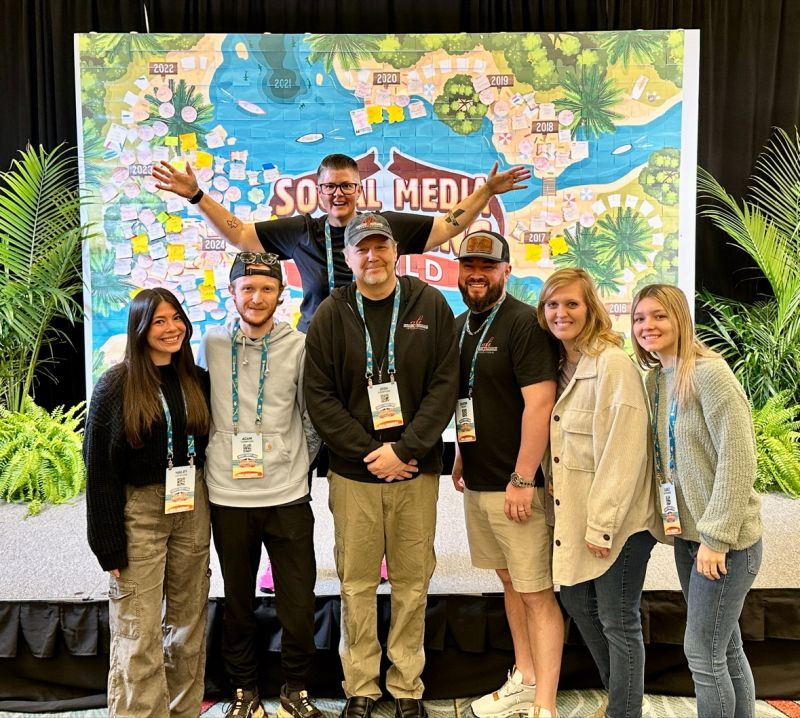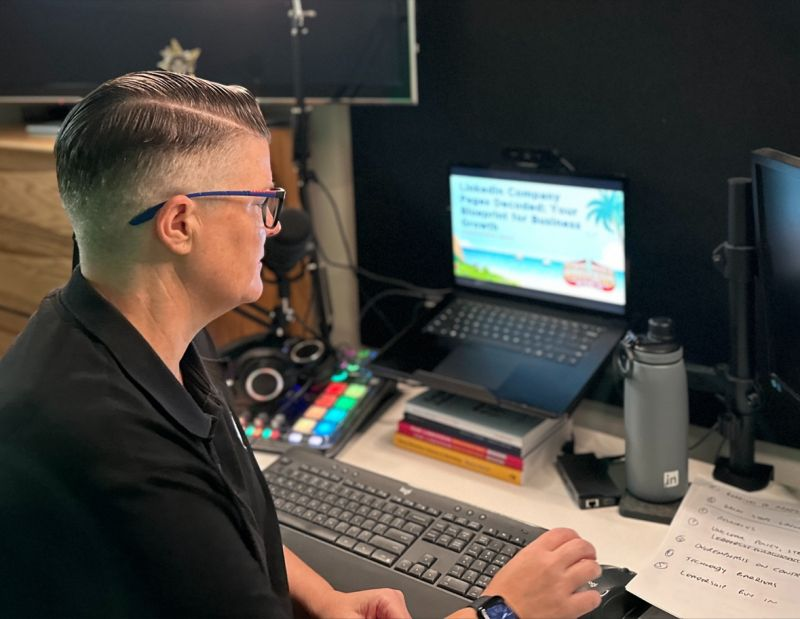[Case Study] LinkedIn Pages Expert Michelle J Raymond

My Journey To Become A Professional LinkedIn Consultant After My Boss Cancelled A $2M Deal
Hello, introduce yourself and briefly share what you do and your work
G’day everyone. I’m Michelle J Raymond, from Sydney, Australia. I am the founder of my company, B2B Growth Co, and we teach B2B businesses how to leverage LinkedIn to grow. I would also like to add that I have the best job in the world. I never expected that I would say those words, but four years into it, I’m living the dream.
So, my business is set up specifically for those companies out there in the B2B space that say, ” We know we should be on LinkedIn, BUT we’re not sure how.” They recognize that their customers are on there. They recognize that the rest of their industries may be active, but LinkedIn can be a pretty confusing place. There are either new features, conflicting advice, or all these bells and whistles that keep coming.
For many, LinkedIn is the scariest of them all when it comes to social media because we don’t want our peers to judge us. We don’t want our boss to see that we have posted something, maybe during work hours. It can be quite tricky and complicated.
So, how I help businesses, I specifically will go in and we’ll analyze and see what is the best strategy to help them achieve their goals. We’ll take a look and see what resources are available and what kind of timeframes they are looking to achieve things.
Then we look at practical things like, do you need an audit or a strategy for your company page? Are the leaders that are going to be active on LinkedIn? Maybe their profiles haven’t been updated in a long time, and I can help them with that.
Also, training via our Masterclasses. It’s important to have a good framework to follow along on LinkedIn. I teach businesses, depending on their situation and priorities, how to use all of the available tools to get the most out of the platform.
I specifically focus on B2B businesses. that’s because I spent 20 years in B2B sales. And so I like to tell people I was sales-born, but maybe marketing-bred. Because I know both sides, I can offer a solution that takes the best of social selling and content marketing.

My clients know I’m a specialist and don’t do every social media platform. And I think people respect that.
How were you introduced to the social media industry?
If we rewind the clock for almost 10 years, I used LinkedIn for what most people know it for. I went for a job on the platform, and I got that job, which was a brand new industry. I moved into selling raw materials and ingredients in the beauty industry. I didn’t know chemistry. I didn’t know science. I didn’t have any existing people in my network in that industry.
They handed me a list of 80 customers spread around Australia with 10,000 ingredients and said, Michelle, go and sell. And I just looked at my new boss and said, “Look, I’m pretty good at sales, but I don’t know how you expect me to tell everyone about this when.” Australia is a big country. His response “Don’t worry, Michelle, just go and sell, just go and do your job.” And I thought, okay, this will be a bit tough for me.
When I was on LinkedIn, I saw people creating content, and I thought maybe if I did a post, I could reach more people that I can’t get out to visit and share about what we do. I tried that, and it was okay. I didn’t really know what I was doing. I was still going to get paid in my normal job. Ultimately, I realized that if you just post content but don’t have a community or an audience, you’re talking to yourself.
That didn’t make sense to me. I decided to take my customer list and connect with those people first. Bit by bit, over the next nearly six years, I built the most amazing community around the beauty space here in Australia and globally because nobody else was doing it back then. So, I really owned that space and found a way to stand out. My bosses, at the time, had no idea what I was doing; they just wanted me to keep selling.
After a while, someone recognized that what I was doing in the industry was really good. I got poached, and I went and worked for a competitor. And that’s often the case that happens in many businesses. Fast forward a little bit, and I got a sale for $2 million worth of business from a LinkedIn post.
I was so excited. But a few weeks later, the owner decided to renege on that contract. To protect my reputation, I quit on the spot and, with my partner’s support, decided I was never going to work for anybody else again.
Until that moment I certainly didn’t have any plans to be an entrepreneur. It was March, 2020. COVID happened. Trade shows got cut down, events got cut down, no more customer visits. And I noticed everyone in my former industry had started to use LinkedIn.
I contacted some of them and shared some tips to make a difference. Thankfully, one person I helped said she wished she could learn from me. And that was my a-ha moment. I wrote a training program, and I went back, and I said, “Ta-da, I can teach your business how to use LinkedIn to grow.” And she replied that they were okay.
And I was so shattered, but I believed in my idea.
So I returned to another client I used to work with. I showed her the training program, and with a look of exhaustion, she asked me if I could create content for them instead of training. At that time, I didn’t even know that was a job.
I didn’t know what a social media manager was or that there were content writers out there, which makes me laugh now. That’s how I got started looking at company pages.
Today I’m known as a global company pages expert because I realized there were so many existing LinkedIn trainers, but not one was speaking about LinkedIn company pages.
So I just took that and went, you know what? You can all talk about the rest of it. I’m going to be the company pages expert. And I have just done that ever since. And it’s been very, very cool to travel the world to talk about company pages.

That’s amazing! Most consultants seem to focus on personal profiles and how to grow a personal audience. It’s also common to see social media professionals trying to become experts in every platform, and you definitely took a different route.
When I started my business, everybody told me I had to be on all the other platforms. Twitter, TikTok, Instagram. They said I should be doing all of these things, being everywhere. I started spending time on these other platforms, forcing myself to be on there and hating every single minute of it.
It wasn’t until I had a cool podcast guest come on my podcast and we talked about high performance. And I remember he said, “Michelle, mastery comes from simplification. Why do you need to be everywhere?”
I went back into my business and looked, and it was not realistic to try to be active on every single platform, be good at all of them, and understand all of them. So, early on, I chose to push aside some of those other platforms, really go hard, and focus on being the best at what I did on LinkedIn.
I realized that if I don’t schedule my content, my day gets away from me as I’m always busy. Scheduling is how I can stay on top of things.
That choice likely contributed to your mental well-being and boosted your productivity as well.
My clients know I’m a specialist and don’t do every social media platform. Yes, I know about other platforms in general, but when it comes to teaching others how to grow their business, LinkedIn is it. And I think people respect that. I personally am not as drained and exhausted as I used to be back in the beginning because trying to keep up with it all is impossible! And I have a lot of empathy for social media managers who are drowning trying to keep up with every platform.
I do not understand how they do it all when their bosses expect them to be experts on every platform, write blog articles, and don’t forget to grow a newsletter subscriber base. Or can you write our internal communications? Can you do our policies?
And for me, I’m really lucky that I’m just a specialist on one platform, and I have the privilege of doing that because it’s my own business. But for social media managers, my advice is just to pick a couple of platforms and be really good at them because the world doesn’t end if you’re not on all of them. Trust me, I’m proof. I’m still here. My business is bigger than ever. It’s continued to grow and grow.
By being focused, I’m able to do things better. And I think that’s a message I would love to get out there for people because there’s so much pressure to do more, be more, and it just doesn’t add up. There aren’t enough hours in the day if what you want to do, which I do, is keep my life in balance, which means I really love the work that I do, and I’m passionate about it. I love helping my clients, but it’s important that I look after my health, my family, and my friends, have a life, and do things that I enjoy.
Because I know when I don’t sleep well, I don’t create good content. It takes 10 hours to do something that should take 10 minutes. And so these are the reasons I think with experience having been in my business for around four years now is that I realized that I’ve got to look after myself, and then I can look after my clients even better, and they’re grateful for it. So no one’s ever told me, “Michelle, why aren’t you on Instagram?” They don’t care. They just know that I’m good at what I do on LinkedIn.
If someone reading this is new to the platform or doesn’t know much about it, what are some simple actions that can help you get better results on LinkedIn?
If you’re new to LinkedIn, your LinkedIn profile should be a priority. Spend some time making sure that it’s been properly updated.
You would expect me to tell everybody you need a LinkedIn company page. Even if you’re a business with only one person, so you’re a solopreneur just starting out, you need a company page to show that you’re a legitimate business.
That way, you can build your personal and business brand together. You’ll never ever regret building brands, and LinkedIn is the place to do it.
Putting some content out there showing that you are a thought leader in your industry is a great place to aim for. But when we start out, just get those basics done. Crawl first, then walk, then run. Trying to do too much too quickly can often cause burnout. It’s important to get the basics right first.
What is the brand that you’re building? What do you want to be known for? Who’s the target client that you’re working with or want to work with? Then, we start from there and start speaking to them.
Any brands that you love and feel like are nailing having a unique, interesting voice online?
I love the SEMrush team’s company page. It is always out there and active, responding to people’s comments and getting involved in conversations. They do such a great job of being active on the platform.
And, of course, Duolingo always gets a look in when it comes to having the power of a character. I love the content that they put out there. They do such a great job.
But one of my favorite brands that’s on LinkedIn is run by New Zealand police. Now, if you think about your local police, is there anything about that you think, wow, I’d really like to see that on LinkedIn? What would they do that’s interesting? And what they’ve really done well is the power of storytelling. So they take whether it’s Mother’s Day or whether it’s like a local event that happens, and they relate that back to policing in the broader community.
What are your favorite tools to run your social media business?
These are my top three tools. Number one is a tool called Descript. That would be because I have to edit my content, and it is the number one tool I find easiest to edit videos, remove all of those “ums” and “ahs,” repurpose video content to turn it into my podcast, or get transcripts. There are so many different ways I can do it if I don’t have any technical background in video editing. So, Descript is number one.
I have to give a shout-out to Canva. It’s an Australian company, obviously. As someone who’s graphic design challenged, it’s been so helpful to have some templates to refer to.
Obviously, I’m a big fan and use Metricool for all of my content scheduling. I realized that if I don’t schedule my content, my day gets away from me as I’m always busy. Scheduling is how I can stay on top of things. And it actually speeds up my whole process. It helps me see what I have coming up, spot any gaps, and reuse content easily.

And last but not least, where are all the places people can find you?
- Michelle J Raymond on LinkedIn
- B2B Growth Co – LinkedIn Consultancy
- Michelle’s YouTube channel
- The Social Media for B2B Growth podcast
- The LinkedIn Branding Show podcast
- Business Gold: Build Awareness, Authority and Advantage with LinkedIn Company Pages (Book)
- The LinkedIn Branding Book: The Power of Two – Build Your Personal and Business Brand on LinkedIn for Exponential Growth

